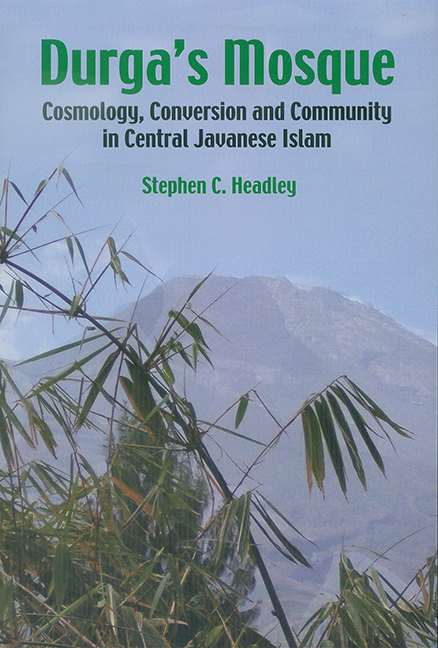Book contents
- Frontmatter
- Contents
- List of Figures
- List of Tables
- Preface
- Acknowledgements
- Introduction: Cosmology, Conversion and Community in Javanese Islam
- PART I THE SOCIOLOGY AND PRACTICE OF RELIGION IN CENTRAL JAVA
- 1 Of Palaces and Placentas: The Praxis of Javanese Kindred
- 2 The Village “Kingdom”: The Bed of Sri and the Realm of Sadana
- 3 Village Goddesses, Their Hierarchy and Clientele
- 4 Deterritorialization: The End of Peasant Livelihood
- PART II RECONSTRUCTION OF LOCAL RELIGIOUS HISTORY
- PART III INVOKING THE COSMOS, MAGNIFYING ALLAH: STRUCTURING A LANDSCAPE IN THE SEVENTEENTH TO NINETEENTH CENTURIES
- PART IV COSMOLOGY, CONVERSION AND COMMUNITY IN CENTRAL JAVANESE ISLAM TODAY
- Bibliography
- Index
- About the Author
2 - The Village “Kingdom”: The Bed of Sri and the Realm of Sadana
from PART I - THE SOCIOLOGY AND PRACTICE OF RELIGION IN CENTRAL JAVA
Published online by Cambridge University Press: 21 October 2015
- Frontmatter
- Contents
- List of Figures
- List of Tables
- Preface
- Acknowledgements
- Introduction: Cosmology, Conversion and Community in Javanese Islam
- PART I THE SOCIOLOGY AND PRACTICE OF RELIGION IN CENTRAL JAVA
- 1 Of Palaces and Placentas: The Praxis of Javanese Kindred
- 2 The Village “Kingdom”: The Bed of Sri and the Realm of Sadana
- 3 Village Goddesses, Their Hierarchy and Clientele
- 4 Deterritorialization: The End of Peasant Livelihood
- PART II RECONSTRUCTION OF LOCAL RELIGIOUS HISTORY
- PART III INVOKING THE COSMOS, MAGNIFYING ALLAH: STRUCTURING A LANDSCAPE IN THE SEVENTEENTH TO NINETEENTH CENTURIES
- PART IV COSMOLOGY, CONVERSION AND COMMUNITY IN CENTRAL JAVANESE ISLAM TODAY
- Bibliography
- Index
- About the Author
Summary
This chapter poses the issue of origin myths of social order in Java, mentioned in passing in Chapter 1. In traditional Indonesian societies origin myths often formed a charter of social morphology. Whether they remain there after the arrival of modern ideologies is, of course, another question. Despite the enormous evolution of Javanese villages through peasantry and beyond, and non obstant post-modernism, the role of these founding myths is still evident. The premise of this myth is that the first kingdom was a primordial village, Mendhang Kamulan. The meaning of the name of this village, “the origin of the rice chaff ”, implies that rice has its origin in the same inhabited space as this first human social organization. There are not many ways to conceptualize the whole of a society like Java and these origin myths have not been sufficiently explored for our purposes. Rape is presented in the best known myth as the reason for the death of the rice goddess from whose fertile body rice and children come. In the other major variant, her younger brother, whom she has attempted to marry, returns to heaven but is reduplicated into the first king of Java, just as she is reduplicated as a rice field python repatriated by peasants to a village granary. Copulation related to rape or incest, rice cultivation and granary rituals are rendered in these myths homologous with the basic configuration of siblingship which orients the peasants in the cosmos and leaves the kingdom with privileged access to this founding princess.
THE BIRTH OF A JAVANESE
If as H.W. Scheffler (1977) has said, “Kinship is a locally elaborated theory to account for how children are born”, then the conceptualization and rituals surrounding birth are indications not only of the Javanese notion of physiology but also of personality formation and psychology. This vein has been mined by Jerome Weiss in his Folk Psychology of the Javanese of Ponorogo (1977, ch. 4). While in the islands to the east and the west of Java, lineage ancestors are often important members of kin groups, on Java these forefathers “are” those unsual older and younger brothers or sisters to Ego, I call “foetus siblings”, which remaining intimate guides throughout life (cf. Ch. 1), even after their former physical “bodies”, the amniotic fluid and placenta respectively, are buried in the ground at birth.
- Type
- Chapter
- Information
- Durga's MosqueCosmology, Conversion and Community in Central Javanese Islam, pp. 98 - 132Publisher: ISEAS–Yusof Ishak InstitutePrint publication year: 2004



